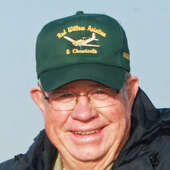- Dining in December at Camp Comeca (12/17/24)
- Trail: Getting in the season’s spirit (12/10/24)
- Trail: Yuletide joy and airport blues (12/3/24)
- A Thanksgiving reflection on history and freedom (11/26/24)
- Sweatshirts, Jazzercise, and an unforgiving political climate (11/19/24)
- After the election: Lessons from history (11/5/24)
- Candy or cash: candidates and causes trick-or-treat for donations (10/29/24)
Opinion
Old buildings tell tales
Tuesday, October 19, 2010
It is all gone now, just an empty cellar hole since filled in and smooth. "It" being the old three story brick building on the corner of Norris and B Streets in McCook. Lately referred to as the Romanoff Building, it was abandoned and becoming derelict the last several years. The City used stimulus dollars to do the demolition. Good riddance and all that now remains are the memories. Ah the memories.
Lamoine Keene told me that it was built originally to be a bank. That explains the once-imposing corner entrance. My wife, Ann, fondly remembers having lunch there at Larry's Café when she was a working girl at the telephone office, a telephone operator, the "number please" lady, some 50 years ago. Larry's must have been the preferred lunch spot in bustling downtown McCook because she always had to wait in line to get one of the limited seats.
Years later, one of the last businesses in the place was Leo McConville's popular coffee shop. Leo loved to bake pies and his were the best. Pie and coffee then back to work.
During my high school years "Big Bills Cigar Store" held sway on the corner just above street level. The half dozen steps leading up to door set directly into the corner made for a grand entrance. I can't remember ever setting foot in the place as my teetotaling mother told me that they played pool inside and I was not to be seen in the place. Big Bill Randolph was the proprietor until he in his new 100 mile per hour Hudson Jet (automobile) wiped out at the foot of "M" hill south on highway 83 early one summer morning, real early!
After the Cigar Store closed it became Brooks Jewelry. Don Brooks, purveyor of fine jewelry, optometry, watch maker and official inspector of railroad watches. I again stayed away but this time for fiscal reasons. My future bride-to-be however liked the place just fine.
During the war, that would be World War II, the last that we won, the McCook Police Department was located in the basement with a stairway entrance off the sidewalk along B Street. Chief Dutcher kept his Hudson Squad Car parked handy along B Street which was two lane traffic with parallel parking along both sides.
Ray Search, owner of the Fox Theatre a couple blocks north was a well know McCook trickster. Ray would make sling shots from natural rubber inner tubes, big sling shots! Then he would stand on top of the Fox and launch railroad torpedoes into the street to land beside the Chief's car. The torpedoes were explosive charges about the size of a golf ball that made a really loud but harmless report when thrown against a hard surface. The railroad trainmen used them for signaling but they always caused Chief Dutcher to come boiling up his stairway and look in vain for the culprit.
There was no traffic light at the intersection then, just an iron lump with the word Stop cast into its sloping sides. The STOP lumps were placed in the middle of Main Street, the name Norris came later, and east-west traffic on B was unimpeded.
I think that one of the last enterprises taking place in the building was an Armed Forces recruiting station, probably the Army and Marines. Not long before the electricity was unhooked, some political candidate set up a campaign office in the place.
The top one or two floors were used as a rooming house. There was a long central east-west hallway with individual rooms each side. The communal bathroom was down the hall. There was no elevator, just a long steep stairway. Living there must have been a real treat before the days of air-conditioning.
Orville Fritsch told me of when he was a mortician's helper and Art received the report of a death up on the top floor. They went up to find a fat old guy that had worked for a local newspaper. The deceased was wearing bib overalls and in the bulging chest pocket they found some $800 worth of greenbacks. Later on a search of the room turned up many thousands of dollars all in cash. Obviously the Nazis had taught him not to trust banks! The room was sparse, and he had few possessions save a bed and a refrigerator. He'd developed a taste for American hamburgers evidently his only source of sustenance.
Orv told me that the gent had been a native of Austria, a printer by trade, and as a young man the Nazis had put him into a forced labor camp. He nearly starved to death as a slave laborer but somehow survived the war. Then following hostilities, he walked back home in search of family. He found that he was the sole survivor; the Nazis had killed all his relatives.
One of his American GI liberators, a reporter in civilian life before being drafted, had befriended him and invited him to America. With no ties he somehow made his way to America and eventually to a job in McCook, Nebraska. His English was poor, yet he told his coworkers how the Nazis had murdered all the rest of his family. He was the only one left and he never married.
Since he died "intestate," his assets were put into an escrow account and should eventually have gone into the local government's general fund.
What happened to the former slave's estate?
That's another story.
That is the way I saw it.

